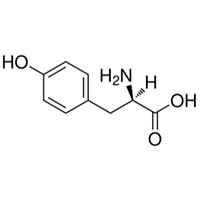Synonyms
L-tyrosine zwitterion
hydrogen L-tyrosinate
MFCD00063073
(2R)-2-amino-3-(4-hydroxyphenyl)propanoic acid
a-Amino-p-hydroxyhydrocinnamic Acid
L-Phenylalanine, 4-hydroxy-
D-p-Tyrosine
EINECS 209-112-6
d-Tyr
Tyrosine, d-
H-Tyr-OH
Tyrosine
(R)-Tyrosine
Product Description
D-tyrosine is a non-essential amino acid that has numerous applications in the pharmaceutical, cosmetic,
and food industries. In this article, we will analyze the product from the perspectives of its medical
uses, upstream and downstream of the industry, market trends, and chemical suppliers.
Medical Uses:
D-tyrosine is a vital component in the synthesis of several important neurotransmitters, such as
dopamine and norepinephrine. It can be used in the treatment of Parkinson's disease, depression, and
attention deficit hyperactivity disorder (ADHD).
Upstream and Downstream Industry:
D-tyrosine can be synthesized from the amino acid phenylalanine, which is obtained from natural sources
like soybeans, meat, and dairy products. It is mainly produced using microbial fermentation technology.
Downstream products of D-tyrosine include drugs, cosmetics, and supplements.
Market Trends:
The global D-tyrosine market is expected to grow in the coming years due to the increasing demand for
nutritional supplements and functional foods. D-tyrosine is also widely used in the cosmetic industry,
particularly in anti-aging products. The Asia-Pacific region is the largest market for D-tyrosine due to
the growing population, increasing disposable income, and the rising demand for nutraceuticals.
Chemical Suppliers:
There are several key players in the D-tyrosine market, including Shanghai Soyoung Biotechnology Inc.,
Iris Biotech GmbH, and Taizhou Crene Biotechnology Co., Ltd. These companies are engaged in the
production and distribution of D-tyrosine for various industrial applications.
Conclusion:
In summary, D-tyrosine is a versatile amino acid with significant medical, industrial, and commercial
value. As the demand for nutraceuticals and anti-aging products continues to rise, the global D-tyrosine
market is expected to grow in the coming years.





